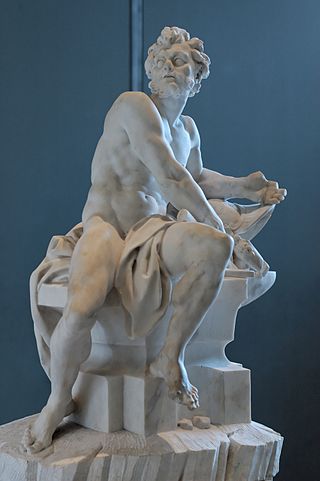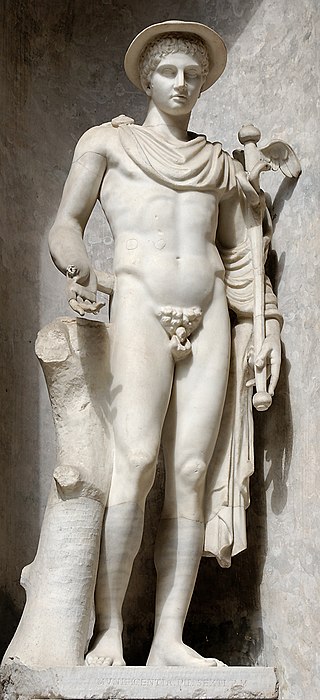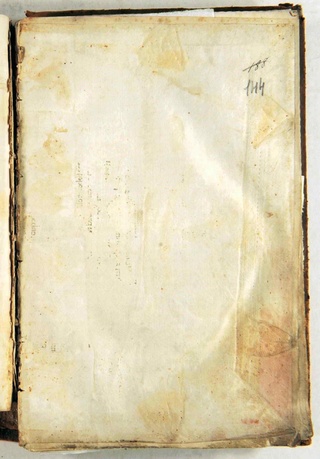Wikipedia does not currently have an article on "Homeric laughter", but its sister project Wiktionary does: You can also:
|  |
Wikipedia does not currently have an article on "Homeric laughter", but its sister project Wiktionary does: You can also:
|  |

Ares is the Greek god of war and courage. He is one of the Twelve Olympians, and the son of Zeus and Hera. The Greeks were ambivalent towards him. He embodies the physical valor necessary for success in war but can also personify sheer brutality and bloodlust, in contrast to his sister, the armored Athena, whose martial functions include military strategy and generalship. An association with Ares endows places, objects, and other deities with a savage, dangerous, or militarized quality.

In ancient Greek religion and mythology, Artemis is the goddess of the hunt, the wilderness, wild animals, nature, vegetation, childbirth, care of children, and chastity. In later times, she was identified with Selene, the personification of the Moon. She was often said to roam the forests and mountains, attended by her entourage of nymphs. The goddess Diana is her Roman equivalent.

In ancient Greek religion, Hera is the goddess of marriage, women and family, and the protector of women during childbirth. In Greek mythology, she is queen of the twelve Olympians and Mount Olympus, sister and wife of Zeus, and daughter of the Titans Cronus and Rhea. One of her defining characteristics in myth is her jealous and vengeful nature in dealing with any who offend her, especially Zeus' numerous adulterous lovers and illegitimate offspring.

Hephaestus is the Greek god of artisans, blacksmiths, carpenters, craftsmen, fire, metallurgy, metalworking, sculpture and volcanoes. Hephaestus's Roman counterpart is Vulcan. In Greek mythology, Hephaestus was either the son of Zeus and Hera or he was Hera's parthenogenous child. He was cast off Mount Olympus by his mother Hera because of his lameness, the result of a congenital impairment; or in another account, by Zeus for protecting Hera from his advances.

Hermes is an Olympian deity in ancient Greek religion and mythology considered the herald of the gods. He is also considered the protector of human heralds, travelers, thieves, merchants, and orators. He is able to move quickly and freely between the worlds of the mortal and the divine aided by his winged sandals. Hermes plays the role of the psychopomp or "soul guide"—a conductor of souls into the afterlife.

In ancient Greek mythology and religion, Leto is a goddess and the mother of Apollo and Artemis. She is the daughter of the Titans Coeus and Phoebe, and the sister of Asteria.

Zeus is the sky and thunder god in ancient Greek religion, who rules as king of the gods on Mount Olympus. His name is cognate with the first syllable of his Roman equivalent Jupiter.

In ancient Greek religion and mythology, Hestia is the virgin goddess of the hearth and the home. In myth, she is the firstborn child of the Titans Cronus and Rhea, and one of the Twelve Olympians.

Eileithyia or Ilithyia was the Greek goddess of childbirth and midwifery, and the daughter of Zeus and Hera. In the cave of Amnisos (Crete) she was related with the annual birth of the divine child, and her cult is connected with Enesidaon, who was the chthonic aspect of the god Poseidon. It is possible that her cult is related with the cult of Eleusis. In his Seventh Nemean Ode, Pindar refers to her as the maid to or seated beside the Moirai (Fates) and responsible for the creation of offspring. Her son was Sosipolis, who was worshiped at Elis.

In Greek mythology the Horae or Horai or Hours were the goddesses of the seasons and the natural portions of time.

In ancient Greek religion and mythology, Iris is a daughter of the gods Thaumas and Electra, the personification of the rainbow and messenger of the gods, a servant to the Olympians and especially Queen Hera. Iris appears in several stories carrying messages from and to the gods or running errands but has no unique mythology of her own. Similarly, very little to none of a historical cult and worship of Iris is attested in surviving records, with only a few traces surviving from the island of Delos. In ancient art, Iris is depicted as a winged young woman carrying a caduceus, the symbol of the messengers, and a pitcher of water for the gods. Iris was traditionally seen as the consort of Zephyrus, the god of the west wind and one of the four Anemoi, by whom she is the mother of Pothos in some versions.
The Homeric Hymns are a collection of thirty-three anonymous ancient Greek hymns celebrating individual gods. The hymns are "Homeric" in the sense that they employ the same epic meter—dactylic hexameter—as the Iliad and Odyssey, use many similar formulas and are couched in the same dialect. While the modern scholarly consensus is that they were not written during the lifetime of Homer himself, they were uncritically attributed to him in antiquity—from the earliest written reference to them, Thucydides (iii.104)—and the label has stuck. "The whole collection, as a collection, is Homeric in the only useful sense that can be put upon the word," A. W. Verrall noted in 1894, "that is to say, it has come down labeled as 'Homer' from the earliest times of Greek book-literature."

Hebe, in ancient Greek religion and mythology, often given the epithet Ganymeda, is the goddess of youth or of the prime of life. She functioned as the cupbearer for the gods and goddesses of Mount Olympus, serving their nectar and ambrosia. People of Sicyon also worshipped her as the goddess of forgiveness or of mercy.

In ancient Greek religion and mythology, the twelve Olympians are the major deities of the Greek pantheon, commonly considered to be Zeus, Poseidon, Hera, Demeter, Aphrodite, Athena, Artemis, Apollo, Ares, Hephaestus, Hermes, and either Hestia or Dionysus. They were called Olympians because, according to tradition, they resided on Mount Olympus.
A theomachy is a battle among gods in Greek mythology. An early example is the Titanomachy, in which the Olympian Gods fought against the preceding generation, the Titans. The war lasted ten years and resulted in the victory of the Olympians and their dominion over the world. Another case is the Gigantomachy.

The section of the Iliad that ancient editors called the Dios apate stands apart from the remainder of Book XIV. In this episode, Hera makes an excuse to leave her divine husband Zeus; in her deception speech she declares that she wishes to go to Oceanus, "origin of the gods", and Tethys the "mother". Instead Hera beautifies herself in preparation for seducing Zeus and obtains the help of Aphrodite. In the climax of the episode Zeus and Hera make love hidden within a golden cloud on the summit of Mount Ida. By distracting Zeus, Hera makes it possible for the Greeks to regain the upper hand in the Trojan War.
Prayer features prominently in the works of Homer. In the Iliad and the Odyssey, gods are portrayed as coexisting and often interfering with the world of the human characters, who often communicate with the gods through prayer. Gods usually hear, often react to and sometimes grant human prayers.

The Iliad is one of two major ancient Greek epic poems attributed to Homer. It is one of the oldest extant works of literature still widely read by modern audiences. As with the Odyssey, the poem is divided into 24 books and was written in dactylic hexameter. It contains 15,693 lines in its most widely accepted version. Set towards the end of the Trojan War, a ten-year siege of the city of Troy by a coalition of Mycenaean Greek states, the poem depicts significant events in the siege's final weeks. In particular, it depicts a fierce quarrel between King Agamemnon and a celebrated warrior, Achilles. It is a central part of the Epic Cycle. The Iliad is often regarded as the first substantial piece of European literature.

Greek mythology is the body of myths originally told by the ancient Greeks, and a genre of ancient Greek folklore, today absorbed alongside Roman mythology into the broader designation of classical mythology. These stories concern the ancient Greek religion's view of the origin and nature of the world; the lives and activities of deities, heroes, and mythological creatures; and the origins and significance of the ancient Greeks' cult and ritual practices. Modern scholars study the myths to shed light on the religious and political institutions of ancient Greece, and to better understand the nature of myth-making itself.

Dialogues of the Gods are 25 miniature dialogues mocking the Homeric conception of the Greek gods written in the Attic Greek dialect by the Syrian author Lucian of Samosata. There are 25 dialogues in total. The work was translated into Latin c. 1518 by Livio Guidolotto, the apostolic assistant of Pope Leo X.